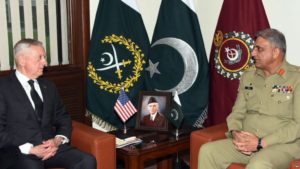
By Arab News
The United States has started making a determined effort to address Pakistan’s long-standing grievances by offering reward money for information on three top Pakistani Taliban commanders currently based in Afghanistan.
Last week’s move could not only placate Islamabad, but also bring it under pressure to consider deeper cooperation with Washington and Kabul to restore peace and stability in Afghanistan. Both the US and Afghanistan have been asking Pakistan to use its influence over the Afghan Taliban leadership to persuade it to hold peace talks with the Afghan government or take action against those who insist on continuing the war.
Until now, Pakistan’s consistent reply has been that it doesn’t have decisive influence on the Taliban leaders to make them change their policy of refusing direct talks with the Afghan government until there has been a complete withdrawal of US-led foreign forces from Afghanistan.
Meanwhile, Afghan President Ashraf Ghani’s Feb. 28 invitation to the Taliban for peace talks and an offer to recognize the group as a legitimate political organization could contribute to the prospects of initiating an Afghan-owned peace process. Taken unaware by Ghani’s generous offer, the Taliban’s formal reply is still awaited.
Though the US has in the past carried out drone strikes in both Afghanistan and Pakistan to kill Pakistani Taliban members, its decision to go after the three top militants could help stop any further deterioration in the relations between Islamabad and Washington. It could also prompt the two to work with each other in the war against terrorism instead of at cross purposes.
The US State Department announced a $5 million reward for information leading to the capture of Mullah Fazlullah, the head of Tehrik-i-Taliban Pakistan, the group that has spearheaded a violent campaign against Pakistan since December 2007 to punish it for joining the US-led war on terror. Under its previous heads, Baitullah Mehsud and Hakimullah Mehsud, who were both killed in earlier US drone strikes, the TTP controlled large tracts of territory in the Federally Administered Tribal Areas, the Malakand division and Swat before suffering defeat at the hands of the Pakistani military in massive operations launched from 2009 to 2014. Fazlullah and his fighters escaped to neighboring Afghanistan in the summer of 2009 and are now reportedly based in Kunar and Nuristan provinces.
Fazlullah, Wali and Bagh are among the most-wanted men for Pakistan, which had already announced reward money for their capture and outlawed their groups. These organizations had claimed responsibility for some of the most horrendous terrorist attacks in Pakistan. Fazlullah’s TTP claimed the 2014 attack on an army-run school in Peshawar, in which 141 people, including 132 schoolchildren, were killed. It also claimed responsibility for the beheading of seven Pakistani soldiers in June 2012, the shooting of Malala Yousafzai in October 2012, and the failed bid by Pakistani-American Faisal Shahzad to detonate an explosive device in Times Square, New York, in May 2010. Among other attacks, Wali’s JUA was accused of killing two Pakistani employees of the US Consulate in Peshawar in March 2016, and Bagh’s men of attacking NATO supply convoys.
The reward offers came two days after a US drone strike on a compound in Kunar killed 21 TTP militants, including Fazlullah’s son Abdullah and suicide bombing trainer Ustad Yaseen. In other recent US drone attacks in Afghanistan, TTP deputy leader Khan Said Sajna and top operative Khalifa Umar Mansoor, the mastermind of the Peshawar school massacre, were killed in Paktika and Nangarhar provinces, respectively.
Those killings and the recent US move to offer reward money for Fazlullah, Wali and Bagh should take care of some of Pakistan’s concerns, though Islamabad will also want the US to help curtail arch-rival India’s influence in Afghanistan. Pakistan will need to take steps to address US concerns, particularly its demand to go after the Haqqani network, which was designated as a terrorist organization by Washington in 2012 after being held responsible for major terrorist attacks in the Afghan capital, Kabul. After a flurry of diplomatic visits and reassuring statements by Pakistan and the US that they wanted to continue efforts to improve relations, a thaw in the relationship is finally becoming visible despite President Donald Trump’s tough language against Islamabad last year.
